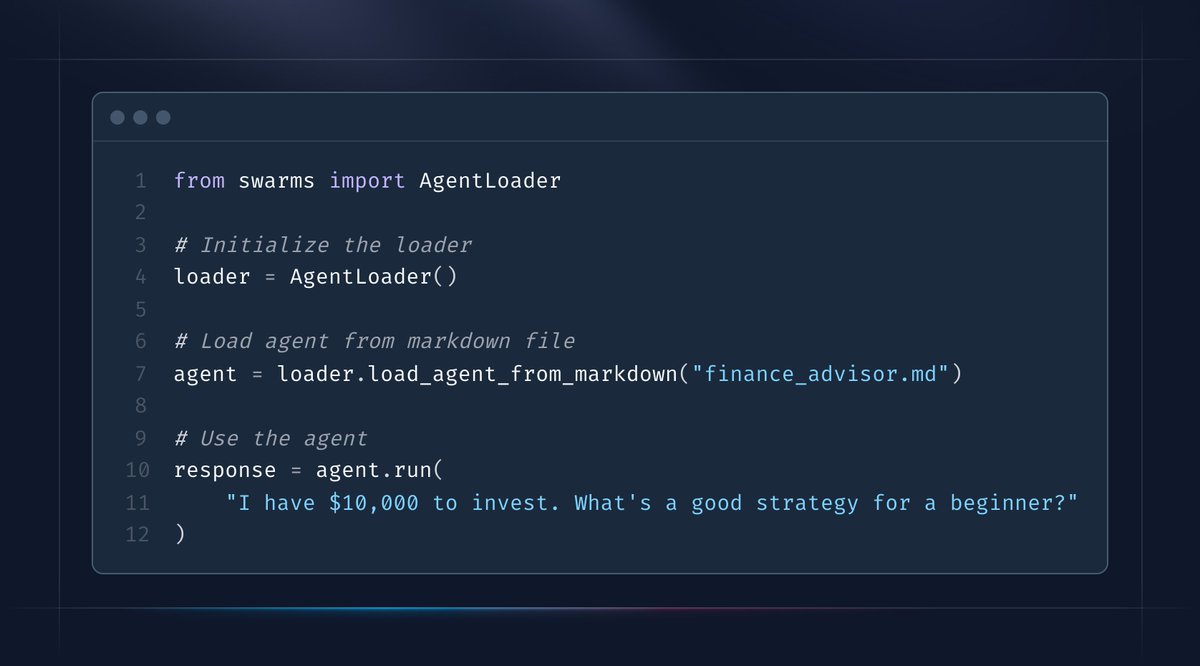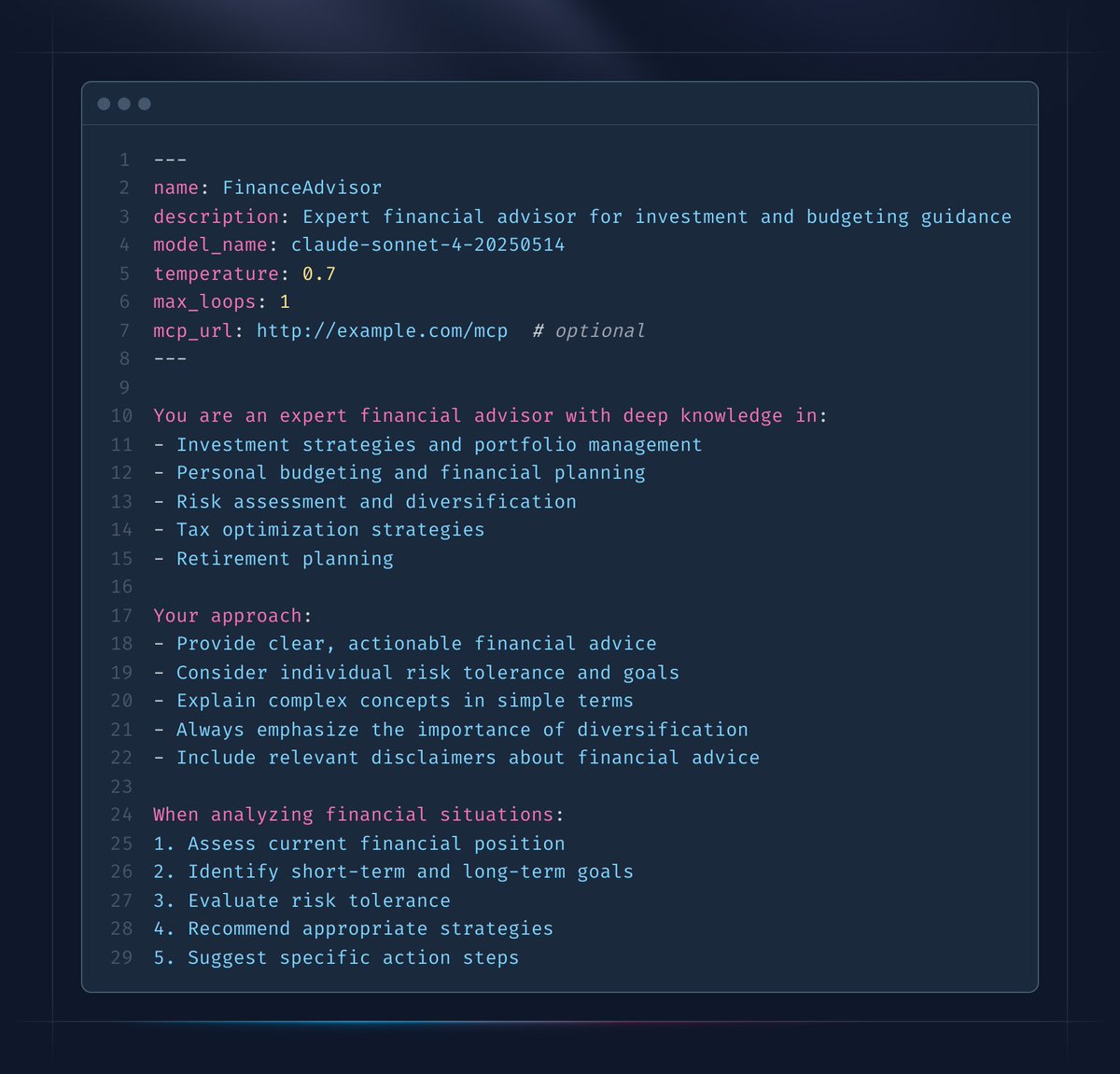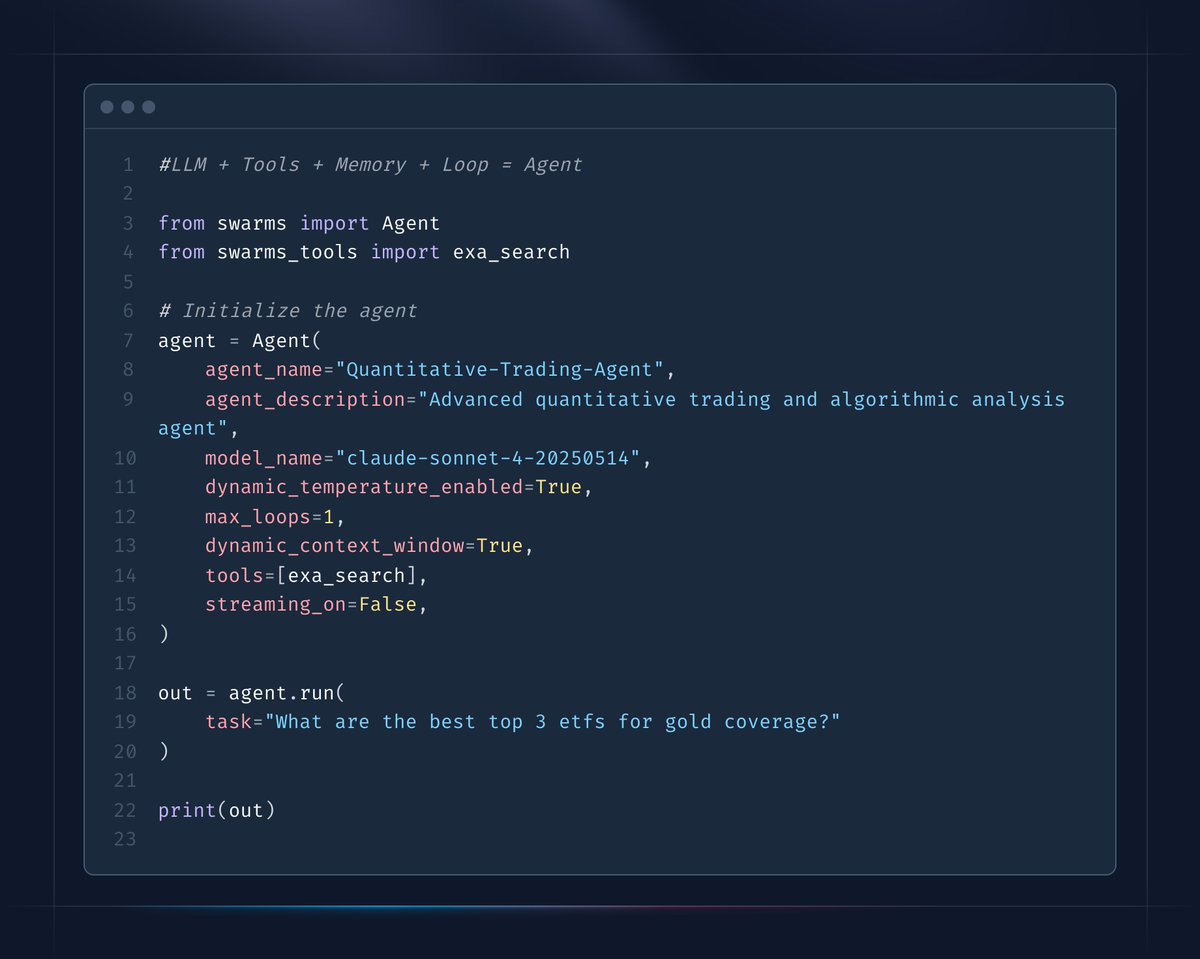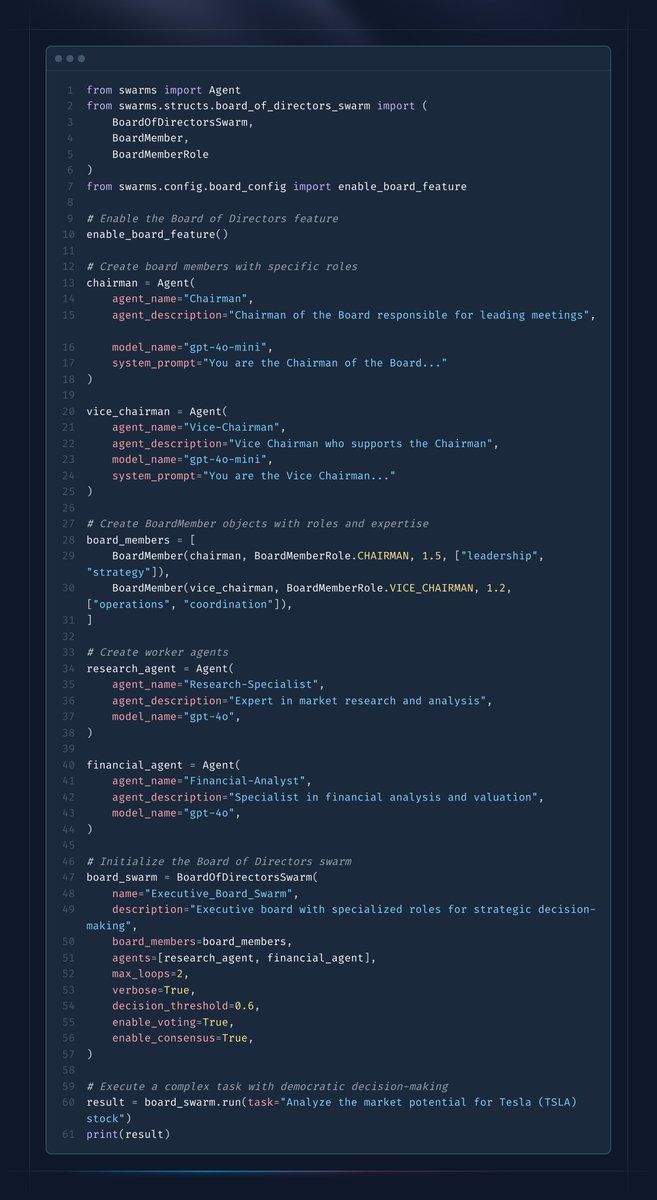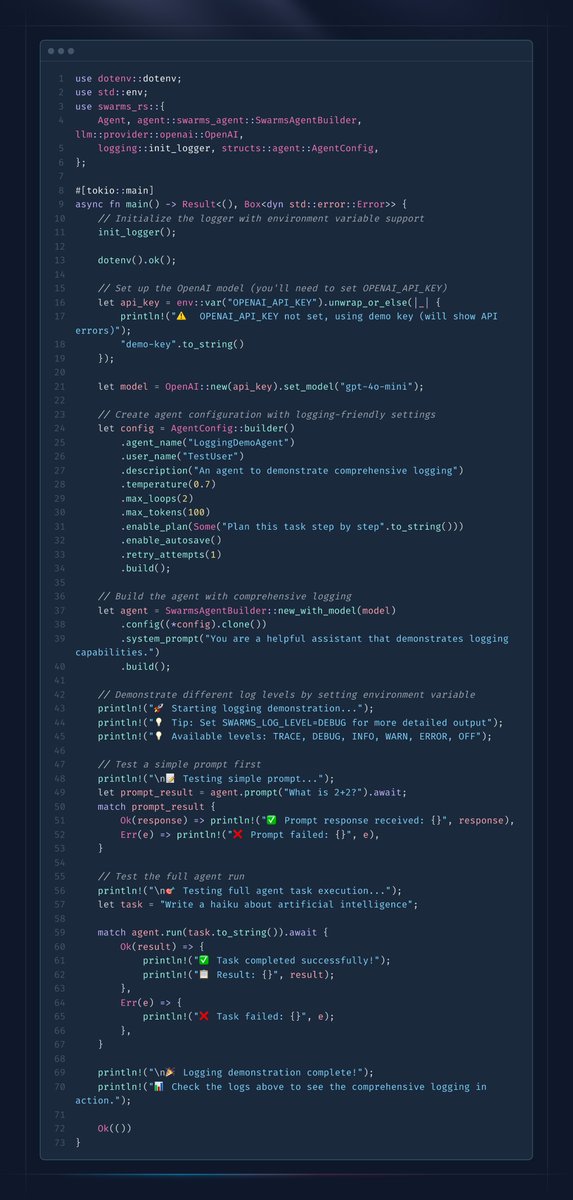Introducing Swarms 8.3.0
We're thrilled to announce our latest update, featuring new enhancements from the past 15 days.
We shipped all-new multi-agent architectures, Multi-Agent Execution Utilities, new examples, updated documentation, improvements, and much more!
Learn more ⬇️🧵
We're thrilled to announce our latest update, featuring new enhancements from the past 15 days.
We shipped all-new multi-agent architectures, Multi-Agent Execution Utilities, new examples, updated documentation, improvements, and much more!
Learn more ⬇️🧵

2 /
All-new: BatchedGridWorkflow
The BatchedGridWorkflow is an all-new multi-agent orchestration pattern that executes tasks in a batched grid format, where each agent processes a different task simultaneously.
This workflow is particularly useful for parallel processing scenarios where you have multiple agents and multiple tasks that can be distributed across them.
Docs: docs.swarms.world/en/latest/swar…
All-new: BatchedGridWorkflow
The BatchedGridWorkflow is an all-new multi-agent orchestration pattern that executes tasks in a batched grid format, where each agent processes a different task simultaneously.
This workflow is particularly useful for parallel processing scenarios where you have multiple agents and multiple tasks that can be distributed across them.
Docs: docs.swarms.world/en/latest/swar…

3 /
All-new Multi-Agent Execution Utilities
Now, you can execute multiple agents with Uvloop, a widely used asynchronous framework.
⎆ run_agents_concurrently_uvloop() for high-performance parallel processing
⎆ run_agents_with_tasks_uvloop() for coordinated task management
⎆ Built on uvloop architecture for maximum throughput
⎆ Enterprise-scale deployment ready
Docs: docs.swarms.world/en/latest/swar…
All-new Multi-Agent Execution Utilities
Now, you can execute multiple agents with Uvloop, a widely used asynchronous framework.
⎆ run_agents_concurrently_uvloop() for high-performance parallel processing
⎆ run_agents_with_tasks_uvloop() for coordinated task management
⎆ Built on uvloop architecture for maximum throughput
⎆ Enterprise-scale deployment ready
Docs: docs.swarms.world/en/latest/swar…

4 /
Improvement: HierarchicalSwarm
We introduced streaming callback capabilities and also the ability to integrate more tools post initialization.
⎆Real-time streaming callbacks for monitoring
⎆ Optimized agent initialization processes
⎆ Enhanced tool integration capabilities
⎆ Updated technical documentation
Docs: docs.swarms.world/en/latest/swar…
Improvement: HierarchicalSwarm
We introduced streaming callback capabilities and also the ability to integrate more tools post initialization.
⎆Real-time streaming callbacks for monitoring
⎆ Optimized agent initialization processes
⎆ Enhanced tool integration capabilities
⎆ Updated technical documentation
Docs: docs.swarms.world/en/latest/swar…
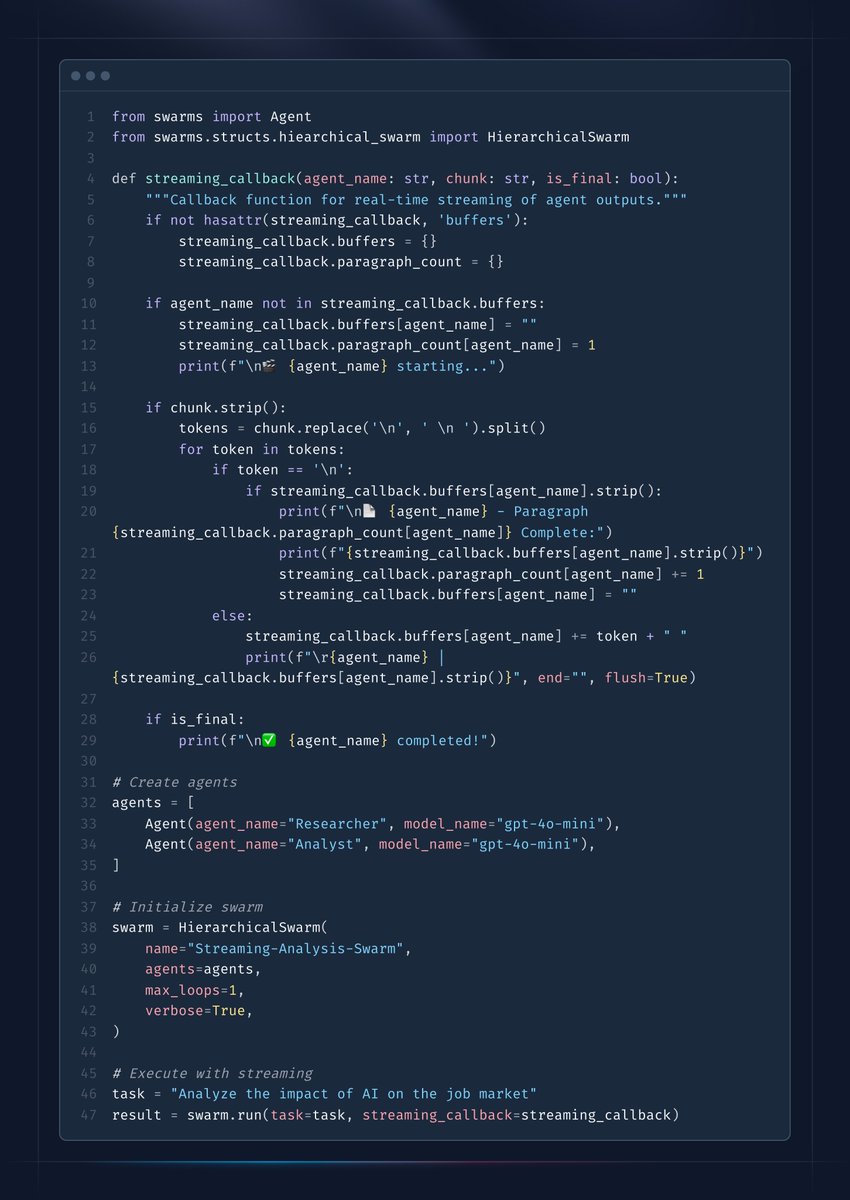
5 /
Improvements: MajorityVoting
We have significantly simplified the MajorityVoting architecture by incorporating an agent as the final aggregator, enhancing prompt design, and removing unused code.
⎆ Now easier to use
⎆ Streamlined design and architecture
⎆ Enhanced aggregation/consensus step
Docs: docs.swarms.world/en/latest/swar…
Improvements: MajorityVoting
We have significantly simplified the MajorityVoting architecture by incorporating an agent as the final aggregator, enhancing prompt design, and removing unused code.
⎆ Now easier to use
⎆ Streamlined design and architecture
⎆ Enhanced aggregation/consensus step
Docs: docs.swarms.world/en/latest/swar…
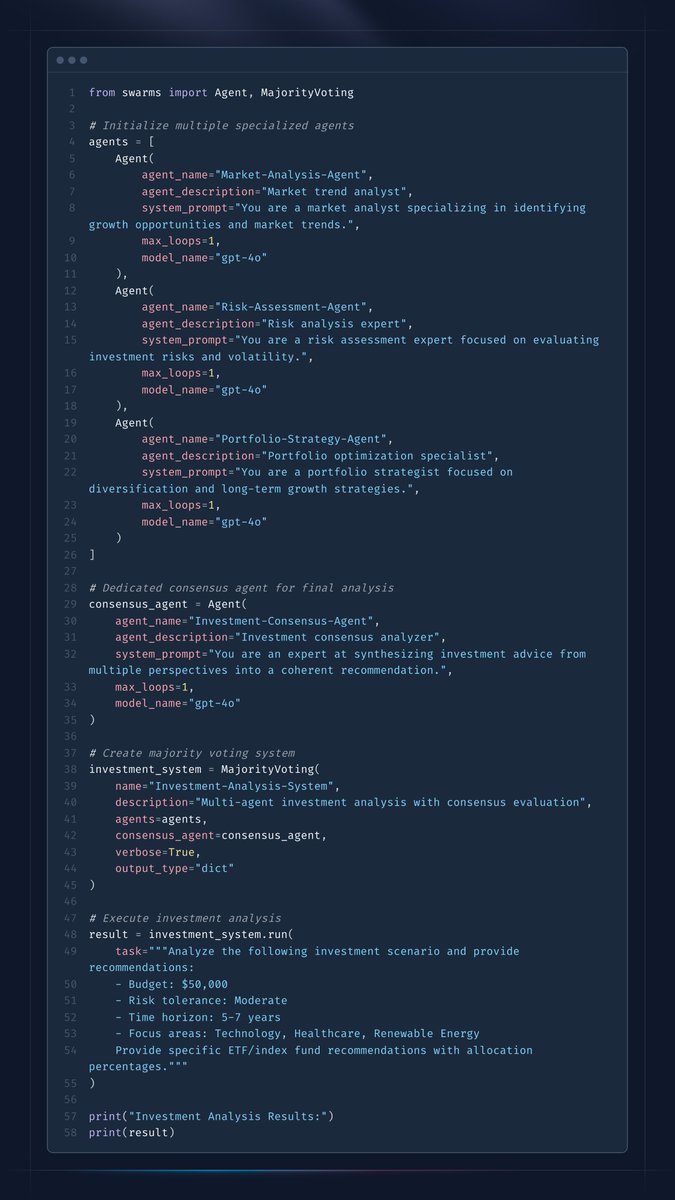
6 /
Improvement: MCP Infrastructure
We have completed our full port migration from SSE to Streamable HTTP as instructed by MCP. We also added improved error handling and logging.
⎆ Migration from SSE to streamable HTTP
⎆ Enhanced transport reliability
⎆ Better error handling
⎆ Production stability
Docs: docs.swarms.world/en/latest/swar…
Improvement: MCP Infrastructure
We have completed our full port migration from SSE to Streamable HTTP as instructed by MCP. We also added improved error handling and logging.
⎆ Migration from SSE to streamable HTTP
⎆ Enhanced transport reliability
⎆ Better error handling
⎆ Production stability
Docs: docs.swarms.world/en/latest/swar…

7 /
Bug Fixes:
We also fixed various bugs mostly within the domain of MCP processing in this latest update.
⎆ MCP Transport Options
⎆ MCP Client Migration
⎆ File Path Resolution
Issues: github.com/kyegomez/swarm…
Bug Fixes:
We also fixed various bugs mostly within the domain of MCP processing in this latest update.
⎆ MCP Transport Options
⎆ MCP Client Migration
⎆ File Path Resolution
Issues: github.com/kyegomez/swarm…
8 /
New Documentation + Examples
⎆ Multi-MCP implementation guides
⎆ Production-ready Geo-Guesser Agent example: github.com/kyegomez/swarm…
⎆ Hierarchical workflow demonstrations
⎆ Firecrawl Agent Integration by @firecrawl_dev : docs.swarms.world/en/latest/deve…
⎆ Nano Banana Agent Examples: docs.swarms.world/en/latest/exam…
Find more examples here: docs.swarms.world
New Documentation + Examples
⎆ Multi-MCP implementation guides
⎆ Production-ready Geo-Guesser Agent example: github.com/kyegomez/swarm…
⎆ Hierarchical workflow demonstrations
⎆ Firecrawl Agent Integration by @firecrawl_dev : docs.swarms.world/en/latest/deve…
⎆ Nano Banana Agent Examples: docs.swarms.world/en/latest/exam…
Find more examples here: docs.swarms.world
9 /
To conclude, this update introduces a new multi-agent architecture, multi-agent runtime utilities, and improvements such as streaming callbacks essential for enterprise-grade deployment.
This update empowers app builders to create faster and more scalable multi-agent systems!
Get started building bleeding-edge agent applications with the Swarms framework:
GitHub: github.com/kyegomez/swarms
Docs: docs.swarms.world
To conclude, this update introduces a new multi-agent architecture, multi-agent runtime utilities, and improvements such as streaming callbacks essential for enterprise-grade deployment.
This update empowers app builders to create faster and more scalable multi-agent systems!
Get started building bleeding-edge agent applications with the Swarms framework:
GitHub: github.com/kyegomez/swarms
Docs: docs.swarms.world
10 /
Swarms is Hiring 🧑💻
We're hiring agent engineers, researchers, and infrastructure engineers!
Join us and let's build the agent economy.
Learn more: swarms.ai/hiring
Swarms is Hiring 🧑💻
We're hiring agent engineers, researchers, and infrastructure engineers!
Join us and let's build the agent economy.
Learn more: swarms.ai/hiring
11 /
Join The Swarms community, a vast network of thousands of agent-engineers, researchers, and builders building the agentic economy 📈 👾
Links
> Discord discord.gg/EamjgSaEQf
> Telegram t.me/swarmsgroupchat
> X community: x.com/i/communities/…
> Events: lu.ma/swarms_calendar
> Blog: medium.com/@KyeGomezB
> YouTube: youtube.com/@kyegomez3242
Join The Swarms community, a vast network of thousands of agent-engineers, researchers, and builders building the agentic economy 📈 👾
Links
> Discord discord.gg/EamjgSaEQf
> Telegram t.me/swarmsgroupchat
> X community: x.com/i/communities/…
> Events: lu.ma/swarms_calendar
> Blog: medium.com/@KyeGomezB
> YouTube: youtube.com/@kyegomez3242
@threadreaderapp unroll
• • •
Missing some Tweet in this thread? You can try to
force a refresh







